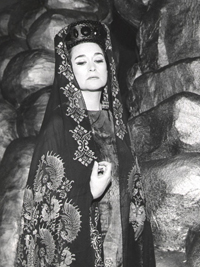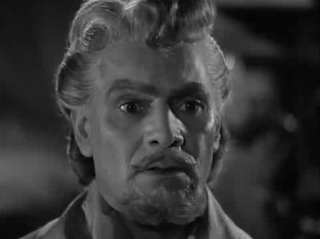Related Research Articles

Luis Ernesto Alva y Talledo, better known as Luigi Alva is a Peruvian operatic tenor. A Mozart and Rossini specialist, Alva achieved fame with roles such as Don Ottavio, Count Almaviva and Fenton. He retired from the stage in 1989.

Leyla Gencer was a Turkish operatic soprano.

Gino Vanelli was an Italian operatic baritone who had an active international career from 1917 until his retirement in 1955. He made several recordings for HMV and Columbia Records, including complete recordings of the operas La boheme, Pagliacci, and Madama Butterfly.
Mario Sereni was an Italian baritone, who sang leading roles at the New York Metropolitan Opera for many years.

Riccardo Stracciari was a leading Italian baritone. His repertoire consisted mainly of Italian operatic works, with Rossini's Figaro and Verdi's Rigoletto becoming his signature roles during a long and distinguished career which stretched from 1899 to 1944.
Carlo Galeffi was a leading Italian baritone, particularly associated with the operatic works of Giuseppe Verdi and the various verismo composers.

Gianni Poggi was an Italian tenor, particularly associated with the Italian repertory.

Afro Poli was an Italian operatic baritone, particularly associated with the Italian repertory.
Giannina Arangi-Lombardi was a spinto soprano, particularly associated with the Italian operatic repertory.
Rosetta Pampanini was an Italian lyric soprano, particularly associated with Puccini roles, especially Madama Butterfly.
Nello Santi was an Italian conductor. He was associated with the Zürich Opera House for six decades, and was a regular conductor at the Metropolitan Opera in New York City. He was focused on Italian repertoire, especially operas by Verdi and Puccini, in a style following the tradition of Toscanini. He made sound and video recordings of Italian operas, including in 1971 Leoncavallo's Pagliacci with Plácido Domingo, Montserrat Caballé and Sherrill Milnes, in 1976 Montemezzi's L'amore dei tre re with Anna Moffo, Domingo and Pablo Elvira, in 2000 Verdi's I due Foscari, and in 2006 Donizetti's Don Pasquale in a Zürich production. Santi conducted from memory, and said "I love all of Verdi, but when he composed Rigoletto, Il trovatore and La traviata he was in a profound state of grace."

Elena Mauti Nunziata was an Italian operatic soprano. Her voice had spinto qualities, with a slightly dark timbre and an easy upper register. She gained international recognition with the title role in Verdi's La traviata at the Teatro Real in Madrid in 1977. At the Metropolitan Opera in New York City, she performed as Mimi in Puccini's La bohème, as La traviata, and as Nedda in Leoncavallo's Pagliacci.

Adelina Stehle was an Austrian Empire-born operatic soprano, associated almost entirely with the Italian repertory. She studied singing in Milan and debuted as Amina in 1881 in Broni in Lombardy. Her career eventually brought her to La Scala in 1890 where she flourished. She took part in a series of important premieres in the 1890s. In 1893 she was the first Nannetta in Verdi's Falstaff to the Fenton of her husband, Edoardo Garbin, and they were later important in the popularization of Puccini's La bohème.

Lina Bruna Rasa was an Italian operatic dramatic soprano. She was particularly noted for her performances in the verismo repertoire and was a favourite of Pietro Mascagni who considered her the ideal Santuzza. Bruna Rasa created the roles of Atte in Mascagni's Nerone, Cecilia Sagredo in Franco Vittadini's La Sagredo and Saint Clare in Licinio Refice's 1926 oratorio, Trittico Francescano. She also sang the role of Tsaritsa Militrisa in the Italian premiere of Nikolai Rimsky-Korsakov's The Tale of Tsar Saltan.
Armando Borgioli was an Italian operatic baritone. He made his début in 1923, and appeared at Teatro alla Scala from 1927. In four seasons from 1931 he appeared at the Metropolitan Opera in New York. Borgioli made studio recordings of Aida in 1928, where he sang opposite Giannina Arangi-Lombardi, and, in 1938, as Scarpia in Tosca with Maria Caniglia and Beniamino Gigli. Borgioli died when his car was bombed while driving to Parma to sing Marcello to Renata Tebaldi's first Mimi in La boheme. Also in the car was another baritone who was injured, yet replaced him in the role with a bandaged nose.

Carlo Sabajno was an Italian conductor. From 1904 to 1932, he was the Gramophone Company's chief conductor and artistic director in Italy, responsible for some of the earliest full-length opera recordings, most of them with the orchestra of La Scala, Milan and prominent singers there. Particularly outstanding among these are his stately, authoritative late-1920s and early-1930s electrical recordings of Don Pasquale, Traviata, Aida, Otello and Bohème.

Luigi Marini (1885–1942) was an Italian lyric tenor.
Nunù Sanchioni was an Italian operatic singer. She was considered one of the finest coloratura sopranos of her generation and was often compared with Mercedes Capsir and Toti Dal Monte. Her best roles included Rosina in Gioachino Rossini's Il barbiere di Siviglia and Gilda in Giuseppe Verdi's Rigoletto.
Bianca Scacciati was an Italian operatic dramatic soprano, noted for her prominence in verismo.

Teatro Coccia is the main opera house in Novara, and is also the most important "historical" theatres in Piedmont. It faces along via Fratelli Rosselli, and delimits piazza dei Martiri to the west and piazza Giacomo Puccini to the east.
References
- ↑ Opera (in Brazilian Portuguese). 1969. p. 3.
- ↑ The house conductor: Lorenzo Molajoli. Accessed April 29, 2012.